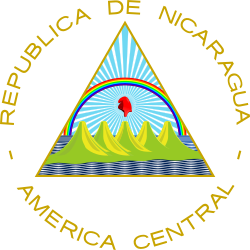 |
|---|
Nicaragua is a country in Central America with constitutional democracy with executive, legislative, judicial, and electoral branches of government. The President of Nicaragua is both head of state and head of government. Executive power is exercised by the government.
Contents
- Executive branch
- Cabinet
- Ministries and dependent entities
- Decentralized entities
- Government-owned enterprises
- Legislative branch
- Judicial branch
- Autonomous entities
- References
Legislative power is vested in the National Assembly. The judiciary and electoral powers are independent of the executive and the legislature. The magistrates of both the Supreme Court (CSJ) and the Supreme Electoral Council (CSE) are appointed by the President and ratified by the National Assembly.